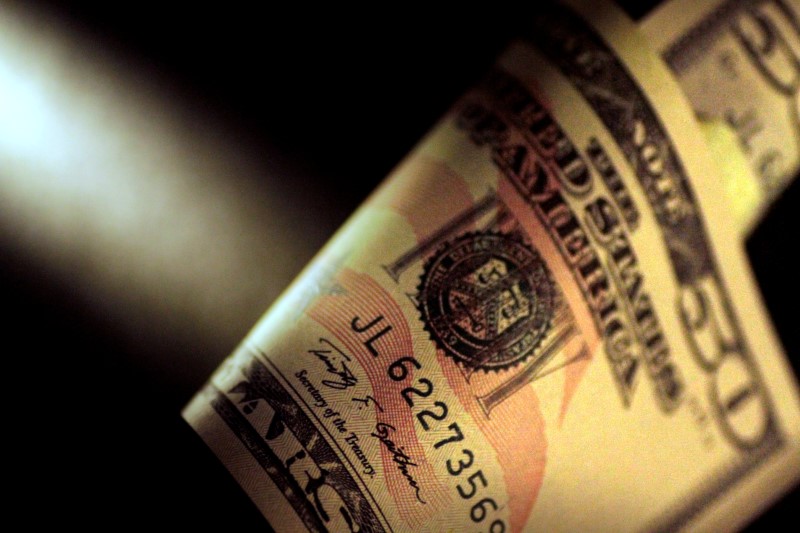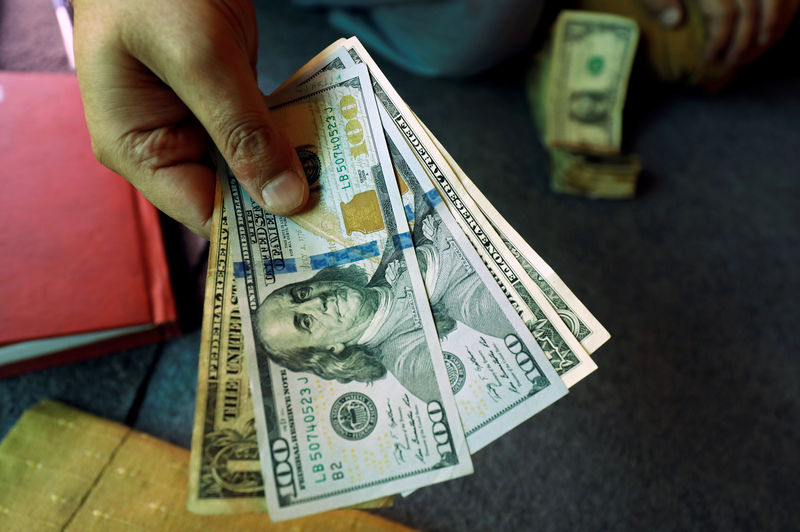By Karin Strohecker and Sujata Rao
LONDON (Reuters) - From Brazil to Norway, policymakers are leaping to defend currencies against the onslaught of the dollar which scaled three-year peaks on Thursday, raising speculation that a joint move by the world's biggest central banks may be in the offing.
A global stampede for dollar funding drove currencies across the world to multi-year or record lows against the greenback. Some relief came after the U.S. Federal Reserve opened $450 billion in swap lines to several central banks but the pressure broadly remains.
Coordinated central bank action remains unlikely for now, market watchers said. But these are unusual times, and Norway's central bank on Thursday threatened to intervene to lift the crown, a step it has not taken in more than 20 years.
The warning followed the crown's 30% plunge versus the dollar in less than three weeks, that was partly fueled by oil's price collapse.
But the dollar's stunning ascent of about 5% this month against a basket of peers, as measured by the U.S. Dollar Currency Index (=USD), has sent almost every other currency reeling. Driven by worries about how badly the coronavirus pandemic will hit the world economy, investors and companies have been scrambling to get their hands on the most liquid currency.
That forced highly unexpected moves such as a 15 basis-point rate rise from Denmark to support its crown while other countries such as Russia and Brazil engaged in direct dollar-buying. And South Africa said it did not rule out emergency interventions.
"If there is one currency causing problems right now and aggravating the sell-off in global asset markets, it is the U.S. dollar," ING Bank told clients.
Could the answer lie in large-scale global intervention to tame the greenback?
Most top central banks, with the exception perhaps of Switzerland, are committed to letting markets determine exchange rates. Yet many welcomed Norway's shift; Danske Bank economist Frank Jullum urged it to buy crowns "by the bucketful".
One issue is that piecemeal central bank interventions are often doomed to fail as individual economies usually lack the firepower to influence currency markets for any length of time But shock-and-awe moves such as the coordinated Group of Seven moves to weaken the yen, seen after the Sept. 11, 2001 terror attacks or the 2011 Japan tsunami, have worked.
Alternatively the United States could act alone, some say, noting that dollar strength was highly unwelcome at a time when the U.S. economy is headed for recession. The last time the Fed went out on its own was in the early 1990s under George H.W. Bush to stem a soaring dollar.
"The U.S. has brought in almost all its instruments, the one that hasn't been done is intervention - the stronger the dollar gets the more likely the U.S. government will consider intervening," said Thomas Flury, head of FX strategies at UBS Global Wealth Management's Chief Investment Office.
"Typical during past crises, FX interventions helped calm not only FX markets but also equities and brought credit spreads down and that is something they will be keen to do."
A report from BofA Global Research said the United States could push for a coordinated foreign exchange response if the U.S. Dollar Index (DXY) breached 104 and the euro broke below $1.05. The index, which measures the dollar against a basket of six others, recently stood at 102.755. The euro was at $1.066.
(GRAPHIC - U.S. Treasury daily FX interventions: https://fingfx.thomsonreuters.com/gfx/mkt/13/3676/3637/U.S.%20interventions.jpg)
OUTSIZE DOLLAR
Dollar strength will dismay not only those in the Trump administration, but others around the world because when the dollar rises, it tends to 'tighten' conditions through channels such as higher import prices or by forcing interest rate hikes to shield currencies.
That in turn risks triggering a full-blown emerging markets crisis, the pattern seen many times in the 20th century.
Its power is down to the outsize role it plays in keeping the world's financial systems ticking over, accounting for 40% of global trade flows, 50% of cross-border lending and 65-85% of the world's risk-free assets, according to Goldman Sachs (NYSE:GS).
"Dollar strength is unwelcome for the U.S. as it tightens financial conditions but for the rest of world it tightens financial conditions even more because many countries are highly dollarised or they have dollar debt," said Claire Dissaux, head of global economics & strategy at Millennium Global Investments.
She doubts so far the pain from the dollar is big enough for Washington to ponder intervention - alone or with G7 peers - and says containing the raging sell-off in equity markets will be the greater focus.
Plus there are the logistics of coordinating such a move with other central banks, many of which will not be keen to see their own currencies strengthening even as world growth nosedives.
Without "credible commitment from a group of central banks it won't work," said Dissaux who believes the best option is more swap lines of the sort the Fed announced on Thursday.
But it is not just the dollar rise that is hurting, but also the brutal volatility. Implied volatility, or expected price swings for some of the world's biggest currencies have rocketed to multi-year highs - one-month Norwegian crown vol is over 30%, triple end-February levels. The euro, pound and all emerging market currencies paint a similar picture.

"The vols are unbelievable. Intervention would quickly kick that lower," Flury of UBS Wealth said, calling it "the fear factor".
